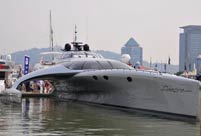HANOI, Oct. 15 -- China and Vietnam have pushed the development of bilateral relations into a new phase with an agreement to further deepen their partnership simultaneously along the three tracks of maritime, onshore and financial cooperation.
Reached during the Sunday talks between visiting Chinese Premier Li Keqiang and his Vietnamese counterpart, Nguyen Tan Dung, the consensus was included in a joint statement released shortly before Li wrapped up his stay Tuesday, and has gained support from other Vietnamese leaders.
During the talks between Li and Dung, the two sides committed themselves to setting up in parallel three joint work groups respectively in charge of the three tracks and setting them in motion within the year.
The three-track approach is an important breakthrough for the future development of bilateral ties, Li said, stressing that the establishment of a work group for maritime cooperation consultations is a positive signal of the two countries' readiness to solve their disputes through cooperation.
The creation of the maritime work group is aimed at advancing China-Vietnam joint development at sea, Li said, calling for substantial progress in relevant programs in waters out of the mouth of the Beibu Bay, a semi-enclosed sea whose delimitation remains under negotiation between the two countries, and accumulate experience for broader maritime cooperation.
As regards onshore cooperation, the two sides need to improve strategic planning with the establishment of a work group on infrastructure cooperation, and promote practical cooperation in such areas as interconnectivity and trade and investment, added the premier.
On the financial front, Li said, the joint work group on financial cooperation should lead the two sides to the signing of a bilateral currency swap deal and a local currency settlement agreement, so as to help safeguard the economic development and financial stability of both countries and the region at large.
In addition, China is ready to work with Vietnam to consolidate the public support for bilateral relations through more people-to-people exchanges and closer cultural and educational cooperation, he added.
For his part, Dung said his country is ready to work with China to further enhance high-level contact, deepen political mutual trust and advance maritime, onshore and financial cooperation so as to achieve positive results at an early date.
Vietnam, he pledged, will join hands with China to strengthen communication and coordination on global and regional affairs, properly handle their differences, and push for closer Vietnam-China friendship and more fruitful bilateral cooperation.
Firming up the China-Vietnam partnership was also the focus of Li's separate meetings on Monday with Nguyen Phu Trong, general secretary of the Communist Party of Vietnam (CPV), Truong Tan Sang, president of Vietnam, and Nguyen Sinh Hung, chairman of the National Assembly.
All the three Vietnamese leaders voiced support for the three-track approach to advancing bilateral cooperation, saying the approach accords with the wishes and interests of both nations and Vietnam is ready to work with China to push forward the development of their relations for the benefit of both peoples.
The Vietnamese side also pledged to continue to play a positive role in further promoting the overall relations between the 10-member Association of Southeast Asian Nations (ASEAN) and China.
In Tuesday's joint statement, the two sides reiterated that they will remain to be good neighbors, good friends, good comrades and good partners, and will continue to work together not only to further advance bilateral ties, but contribute to regional and global peace, stability and development.
As regards the bilateral dispute in the South China Sea, the two sides reaffirmed their commitment to handling their differences in a proper manner and preventing the issue from disrupting their overall cooperation.
On the business front, Li laid out a four-point proposal on further deepening bilateral business cooperation at a luncheon on Tuesday attended by his Vietnamese counterpart and representatives of the two countries' business communities.
He urged the two countries to integrate their development strategies and accelerate the expansion of their economic and trade cooperation with a market-oriented, enterprise-centered approach.
He also called upon the two sides to further promote the liberalization and facilitation of bilateral trade and investment, and expand the scale of bilateral currency swap and local currency settlement so as to provide sufficient financial support.
Speaking about China's economic performance, the premier said that, with the Chinese economy growing steadily on the basis of stability, China is fully able to achieve this year's major socioeconomic development targets.
China will stick firmly to the path of economic reform, and China's development will provide Vietnam and the region at large with a huge market and a multitude of development opportunities, Li added.
Also speaking at the luncheon, Dung noted that economic and trade cooperation is an important pillar in the edifice of bilateral friendship, and pledged that Vietnam is willing to create a more favorable environment for Chinese enterprises to invest in the country.
In order to boost bilateral people-to-people exchanges, the Chinese premier met with Vu Xuan Hong, chairman of the Vietnam Union of Friendship Organizations, and paid a visit to Vietnam National University.
The development of bilateral ties cannot be separated from the support of the two peoples, he said during his meeting with Hong, urging relevant organizations of the two countries to help pass on the bilateral friendship to more people and future generations, so as to keep the tree of China-Vietnam friendship green forever.
Vietnam is the last leg of Li's first Southeast Asia tour as premier, which had taken him to Brunei and Thailand. While in Brunei, he attended a series of East Asian leaders' meetings and expounded China's policy on promoting regional cooperation and development.
 2013 Colour Me Rad 5K run held in Canada
2013 Colour Me Rad 5K run held in Canada China's destroyer Qingdao sails out of Sydney Harbor
China's destroyer Qingdao sails out of Sydney Harbor Chinese tycoon aims to restore London's Crystal Palace
Chinese tycoon aims to restore London's Crystal Palace Worst flooding hits Yuyao, 70% of downtown area underwater
Worst flooding hits Yuyao, 70% of downtown area underwater Game for the brave: 'Spiders' in Yandang Mountains
Game for the brave: 'Spiders' in Yandang Mountains Hungarian wingsuit flyer confirmed dead in Zhangjiajie
Hungarian wingsuit flyer confirmed dead in Zhangjiajie Chinese screen goddesses from Beijing Film Academy
Chinese screen goddesses from Beijing Film Academy  Weekly Sports Photos
Weekly Sports Photos World's most amazing yacht on display in Guangzhou
World's most amazing yacht on display in Guangzhou Photo collection of Chinese Navy
Photo collection of Chinese Navy Photo story: Young tenants in Beijing
Photo story: Young tenants in Beijing Twins Culture Festival kicks off in Beijing
Twins Culture Festival kicks off in Beijing UNESCO world heritage site: Montale Tower
UNESCO world heritage site: Montale Tower Israeli drone crashes into Mediterranean, fragments recovered
Israeli drone crashes into Mediterranean, fragments recovered Fiber-optic wedding dress show shinning in Suzhou
Fiber-optic wedding dress show shinning in Suzhou Day|Week|Month